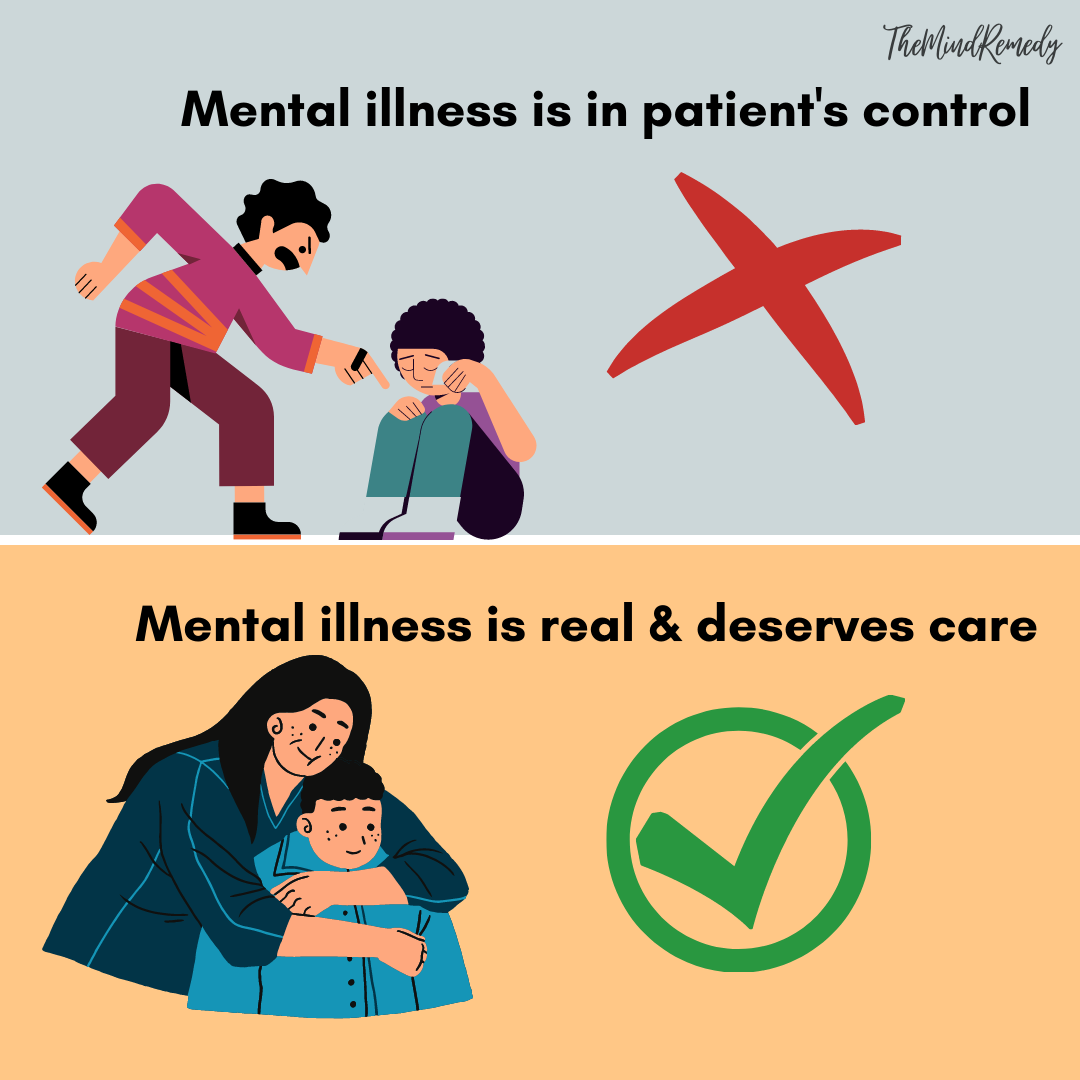- Mental illness is real: As a mental health professional many a times I have come across families who chose to believe that there is no such thing as mental illness, and these families are the ones who are well educated. They simply state that their patient is probably faking it or overreacting! This is very heartbreaking to see the amount of stigma attached and lack of awareness that people simply reject the whole spectrum of mental health unlike physical health. For this very reason it is important that we learn some quick facts about mental illness.
- Mental illness is treatable: Like any other illness (like diabetes) mental illnesses are also treatable with help of medications and psychotherapy. Due to dearth of awareness about these mental illnesses we chose to believe that once a person has it, he has it forever! However, the good news is these illnesses/ psychiatric disorders can be treated and the person can go back to his usual functioning in most cases (depending upon the course of illness, treatment and other factors).
- It affects large number of population irrespective of age, race, gender and social status: In the last few years mental illness have risen in number reaching to approximately 264 million people suffering from depression alone across the globe (WHO). These figures are expected to rise drastically after the pandemic. Mental illness is prevalent across all the community and does not spare on the basis of race, gender or social status.
- There are variety of mental illness and not just depression: It is true that depression is a common mental illness and suicide is second leading cause of death among youths (WHO) but there are different types of mental illness including Anxiety, Obsessive Compulsive Disorder, Phobia, Schizophrenia, Panic Disorder, Post Traumatic Stress Disorder, Bipolar Affective Disorder, Substance Use Disorders, Oppositional Defiant Disorder, to name a few. All these illnesses have different characteristics and manifestations. These disorders are also prevalent in our society and people around us.
- Stress may not be a cause of mental illness every time: Psychiatric/ Mental illness are caused due to imbalance in the neurotransmitters in our brain, stress may contribute to exacerbation of symptoms but cannot be the sole criteria of it. Management of stress should be practiced however one should not just rely just on these management techniques when we see clear cut signs of deteriorating mental health in self and family member, and should seek professional help.
- Mental illness is not a sign of weakness or a result of overthinking: Traditional thinkers may believe that a person is mentally weak therefore he is experiencing mental illness, however one of the quick facts about mental illness is that it is neither a sign of weakness nor a result of overthinking. Disorders do not attack on so called “weak” or “strong” mind. When it comes to overthinking, a person cannot simply develop a psychiatric condition by overthinking but it can be other way around, ruminating thoughts can actually be a symptom of mental illness and not the cause.
- “Positive vibes only” is not the solution to mental illness: Mental illness patients cannot just simply recover by being positive! There are times when patients are helpless and hopeless, getting up in the morning and brushing teeth is a mission, and they just cannot practice positive vibes in such circumstance when they are actually, contemplating about their lives. It is time that we as society become aware and not simply give inappropriate suggestions. We can however encourage everyone to practice a good mental health routine but it can be difficult for the patient to follow all of it when his/her symptoms are florid.
- Changing the place or getting him married is not a permanent solution: Usually after a vacation or having a new person in our life may make us happy or contented. This isn’t however true when we are talking about a person experiencing mental health condition because wherever he may go or get married his illness will stay with him unless treated.
- Attitude towards the mentally ill patient will impact his symptoms: I see different kinds of families of patients, some of them are empathetic while others are critical. These emotions of family members or caregivers impact the condition of the patient, statements like “You just want to irritate us, that’s why you are behaving like this”, “You just want to be lazy”, “I am sure you can control your thoughts, don’t seek attention” can definitely worsen the symptoms. Caregivers should be genuinely empathetic and understand that symptoms aren’t in patient’s control.
- People with mental illness equally deserve dignity and care: Mentally ill person at times may have inadequate judgment or poor understanding of surroundings, but he deserves to be respected and cared. As society we must protect their rights and must not forget they are humans!
what next after understanding the quick facts about mental illness?
Breaking the chain of stigma and spreading further awareness should be the next step forward after learning about the facts of mental illness. As families of patients, they must understand their vital role in affecting the symptoms in patient and overall healing.
Gradually if we as society are able to achieve these goals then mental illness will come at par with physical illness in terms of accessibility and acceptance!

